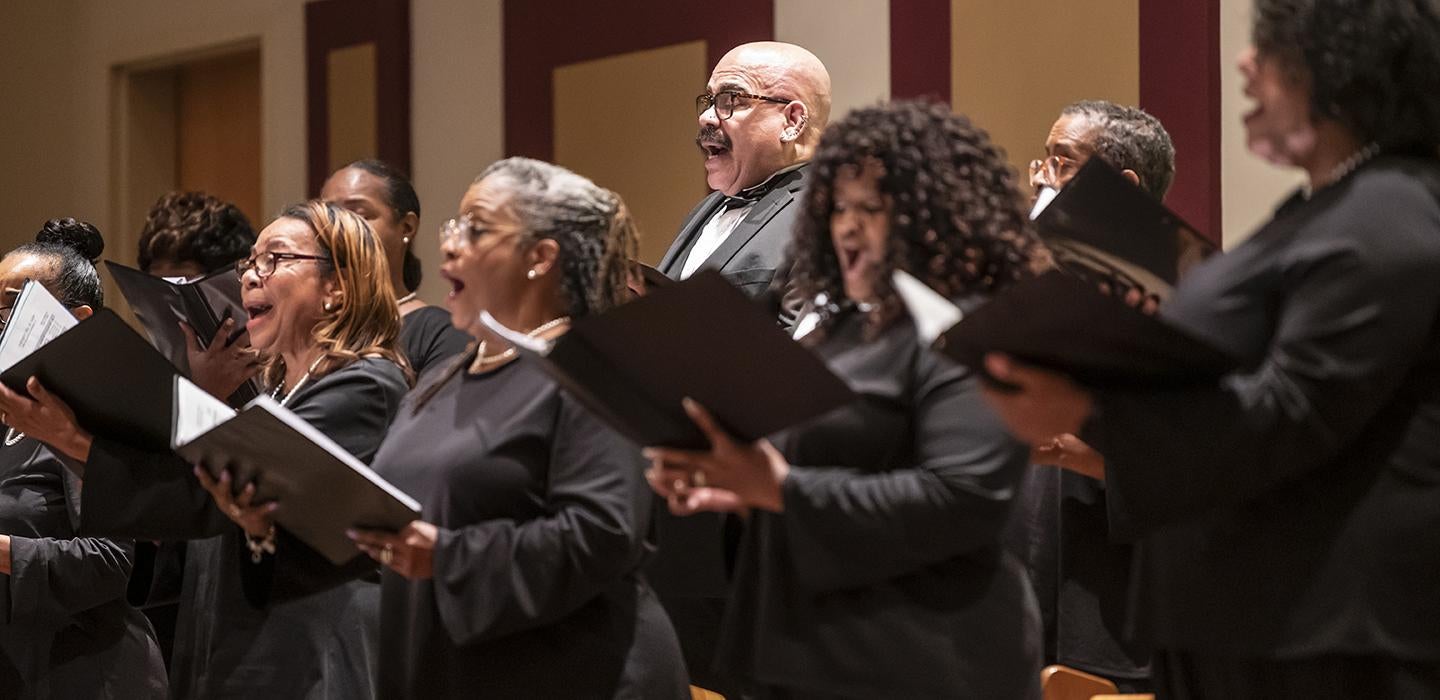
Subscribe to Pittwire Today
Get the most interesting and important stories from the University of Pittsburgh.Songs resurrected after more than six decades of silence rose to the upper pews of the Hill District’s Ebenezer Baptist Church on Saturday, March 25.
The Heritage Gospel Chorale of Pittsburgh, under the direction of Herbert V.R.P. Jones, performed music both reverent and jubilant during, “A Gospel Music Tribute to Charles and Frankie Pace.” It was the capstone to a daylong celebration of gospel music pioneer and composer Charles Henry Pace and his wife, activist Frankie Pace, which also included a musicology conference, keynote address and park rededication.
The tribute was a concerted effort by a team of historians, librarians, artists, musicians and church administrators from across the University and city of Pittsburgh who were committed to recovering Pace’s gospel songs. The process began over two decades ago when the University of Pittsburgh Library System (ULS) purchased Pace’s printing materials at an auction from owners who bought the Pace family’s music store and all its contents from Frankie in 1989.
“We’ve only recently realized that most of the music doesn’t survive in printed form, so we’ve launched this project to recover the music from the plates and other business materials,” said Lynch, project coordinator for the ULS’s Center for American Music and the primary scholar leading the rediscovery efforts.


“Charles Pace was one of the most important composers and publishers of the first generation of gospel artists,” Lynch said.
The Charles and Frankie Pace archival collection includes nearly 170 recovered pieces of Pace’s music, letters, business papers and photographs, as well as about 250 printing plates — metal plates that Pace used on a printing press to produce printed sheet music. The recovered printed music was used in the concert at Ebenezer and is now available online for anyone to view.
“It was an old printing process that dates to the early days of photography — it wasn’t unique, but what was unique was that Charles, with the help of Frankie, did every step, which speaks to their institution building,” said Lynch. “There was no one else to rely on.”
Pace helped establish the genre’s stylistic conventions and business practices. He was one of the first to record and publish Black Baptist performers and paved the way for future singers like world-renowned Mahalia Jackson and contemporaries like Thomas A. Dorsey, often called the father of gospel music.
During his keynote address which featured music from the Pace Jubilee Singers — the first group to record several gospel hits, including “Certainly, Lord,” Reed College music professor Mark Burford praised Charles’ innovation.
“He institutionalized Black gospel and built it into a field of cultural production,” he said, noting the couple’s joint efforts to promote entrepreneurship, multimedia performance and community support for future generations. “I feel proud to participate in a celebration that will also illuminate Pace’s place in American history.”
While Charles focused on music, Frankie operated the Pace Music Store, which doubly served as a base for the Citizens Committee for the Hill District Renewal. As committee director, she sought to combat the city’s displacement of locals. One of the homes she saved through her advocacy was that of playwright August Wilson.


Wilson’s niece and founder of the Historic Hill Institute, Kimberly C. Ellis, read a proclamation from the Pittsburgh City Council announcing March 28th as “Charles and Frankie Pace Day” at the rededication of Frankie Pace Park. Ellis served as artist and historian in co-creating the park and advocated for its name.
The park features a pavilion, garden, statues inscribed with proverbs from various cultures and a display for abolitionist, journalist, educator, doctor and entrepreneur Major Martin R. Delany. Visitors will also see illustrations of a fictional girl named “Keisha,” whose smile and braids represent the bright future of Black Pittsburgh and those who unapologetically embrace their identity and history. LaQuatra Bonci, the award-winning local landscape architecture firm that helped redesign Pitt’s Schenley Quad and Bigelow Boulevard, was pivotal in the park’s design, which cost $32 million and took six years to complete before opening in 2021.
Members of the Pace family were also present for the tributes. “Three things were central to my grandparents: faith, the importance of place and the intrinsic value of people — all of which shone through their work,” said Frank Derek Barnes, the son of Frances Pace Barnes (EDUC ’62), the only surviving child of Charles and Frankie. “We’re commemorating the collection and preserving their legacy. Elements of persistence, which seem so distant from our personal experiences, are intimately ingrained and part of our lineage and trajectory [and] help us understand the foundation you stand on.”
His mother, Pace Barnes, said the University’s recognition of her parents is positive for future students and the broader city community.
“There is a very rich history of what African Americans contributed,” she said. “A tremendous amount of talent came out of this city [and] is part of the culture I hope the University will continue to embrace.”
— Kara Henderson, photography by Aimee Obidzinski









